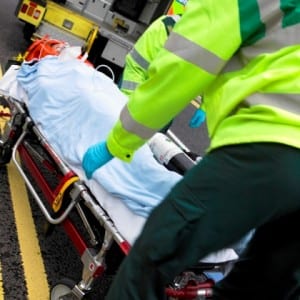 Members of CaHRU have started this February 2020 a major NIHR-funded study on Community First Responders (CFRs) which aims to understand their role in the current and future rural healthcare workforce. CFRs are members of the public who have received basic health training or off-duty healthcare staff who volunteer to provide first aid, helping ambulance services to provide care for people with emergencies such as cardiac arrest. The service depends on altruistic people within local communities to be first to arrive at the scene of an emergency and to sometimes administer treatment.
Members of CaHRU have started this February 2020 a major NIHR-funded study on Community First Responders (CFRs) which aims to understand their role in the current and future rural healthcare workforce. CFRs are members of the public who have received basic health training or off-duty healthcare staff who volunteer to provide first aid, helping ambulance services to provide care for people with emergencies such as cardiac arrest. The service depends on altruistic people within local communities to be first to arrive at the scene of an emergency and to sometimes administer treatment.
The 2.5 year nationwide project, led by Professor Niro Siriwardena director of CaHRU and funded by the National Institute for Health Research Health Services and Delivery Research programme, will investigate various aspects of the CFRs’ role including their contribution to care, cost effectiveness, and experiences and views of patients, CFRs and healthcare staff and commissioners. This information will help to build  recommendations that help NHS Trusts to make better decisions about how best to involve CFRs in pre-hospital urgent care. Co-investigators include Dr Zahid Asghar, Dr Murray Smith, Viet-Hai Phung, Ian Trueman, and Prof Roderick Orner, together with Amanda Brewster and Pauline Mountain, who are key public patient and public involvement professionals and members of the Healther Aging Patient and Public Involvement (HAPPI) group. The research study led by the University of Lincoln, also involves seven of the 13 ambulance NHS trusts in the UK, and collaborator, Prof Richard Parish from the National Centre for Rural Health and Care. The team have been joined by Dr Jasmine Harvey as project manager and postdoctoral research associate, with two additional postdoctoral researchers joining the team later in the year.
recommendations that help NHS Trusts to make better decisions about how best to involve CFRs in pre-hospital urgent care. Co-investigators include Dr Zahid Asghar, Dr Murray Smith, Viet-Hai Phung, Ian Trueman, and Prof Roderick Orner, together with Amanda Brewster and Pauline Mountain, who are key public patient and public involvement professionals and members of the Healther Aging Patient and Public Involvement (HAPPI) group. The research study led by the University of Lincoln, also involves seven of the 13 ambulance NHS trusts in the UK, and collaborator, Prof Richard Parish from the National Centre for Rural Health and Care. The team have been joined by Dr Jasmine Harvey as project manager and postdoctoral research associate, with two additional postdoctoral researchers joining the team later in the year.
A particular focus of the research, as well as looking at benefits, will be to include consideration of patient safety and governance aspects of using CFRs. Prof Siriwardena said, “We are excited to be starting this important study, which will supports the many thousands of volunteers who are working for CFR schemes, ambulance services and commissioners, who need and want evidence for what they are doing and what they might do in future. We’ve spread the work over five work packages, each of which looks at a specific dimension of CFRs’ work in detail, and we will combine this knowledge to develop recommendations for rural CFRs”.
